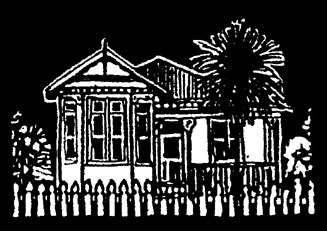This page covers:
- What’s involved with a concert?
- What’s Eden Park Trust Board’s (EPTB) real financial position?
- Don’t trust the EPTB survey nonsense
What’s involved with a concert?
As per Eden Park Trust Board’s (EPTB) application, these take 7 days to bring in and construct – and can be more for
larger stages, and 3 days to remove plus turf remediation.
Often for large acts with large complex stages, they travel with multiple stages, which leapfrog venues.
These can be in 30-40 40ft containers, and arrive 1-3 weeks before the concert. These are then built and await the arrival
of the production equipment – being sound; lighting; video and musical equipment.
The production gear has come directly from the previous concert, usually for Auckland from overseas, but can be trucked
from other venues around New Zealand. For Elton John, the 25 trucks traveled from Napier, and only arrived at 3am.
It will always be on a tight schedule – it must be loaded in a set production order, and is a complex process requiring on site
trucks, and movement of containers and trucks to the build sites. This usually happens overnight – with hundreds of staff
and dozens of truck/container movements overnight. It can be a noisy process, and involves multiple movements on and
off site, with associated parking and queuing of trucks.
The reverse process is then done at the end of the concert and again runs overnight – often until after 3-5am. This is a
crucial process, as the production equipment will be on a tight timetable to allow the next concert to happen. Therefore, it
will run over night no matter what – there will be millions of dollars at stake if schedules aren’t met.
To give some further scale:
Taylor Swift had 36 containers for the stage on site beforehand. There were 58 trucks for production equipment arriving
during the day before, and into the early hours of the concert day.
Packout commenced straight after the concert through until 5.30am, trucks stacked in the ground and surrounding streets.
Queen and Elton John each had 25-32 truck/containers onto the site, with the Elton John trucks not arriving until 3am.
With the cancelled shows pack out was much easier than scheduled.
Images
We can see the size and complexity of some of the stages.
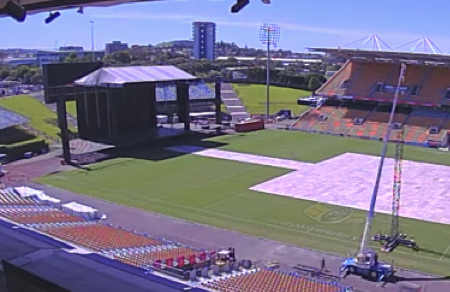
This is the “std” large stage under construction at Mt Smart for Justin Bieber.
This stage has the Stage speaker arrays at 22m, and below we can see the start of the construction of one of the down ground delay/relay towers.
And some turf protection down – used for the Adele concert (2017).
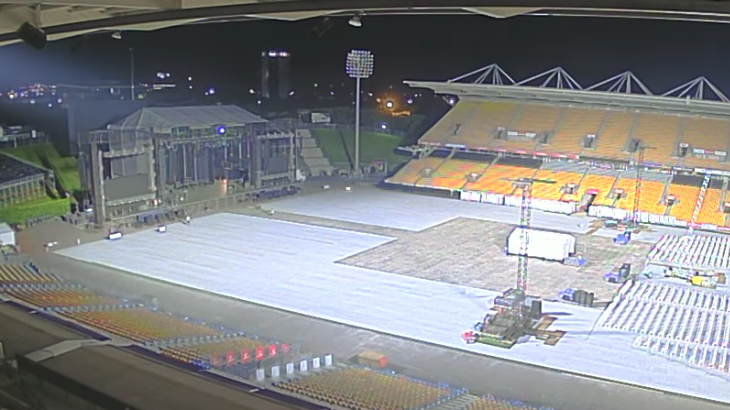
And later that night the stage nearing completion but no production/speakers /videos etc in yet
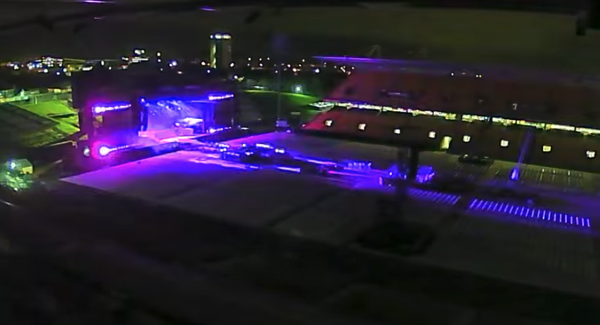
And the following night – production loaded in, and light testing underway
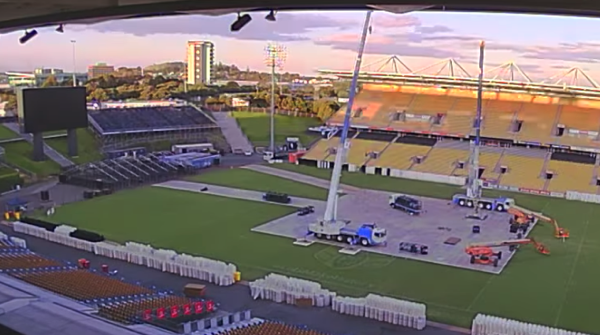
Then overnight after concert production trucked out, and stage pack out over next 2 days.
While towards the end, the Adele stage started to be constructed.
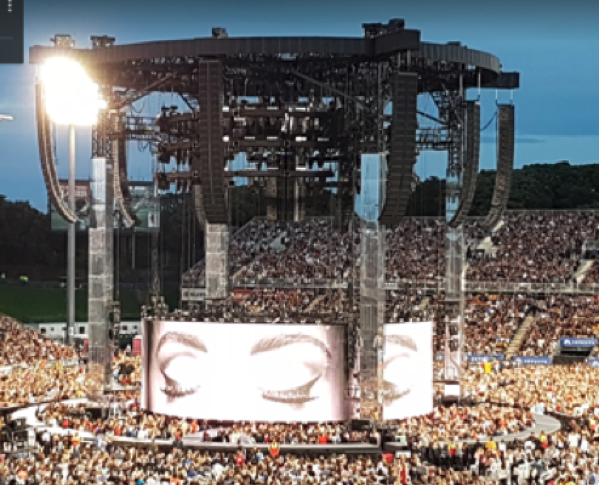
This took several days and nights to construct.
Adele in 2017 at Mt Smart had a very large and complex stage that took 2+ days to take down – including over-night.
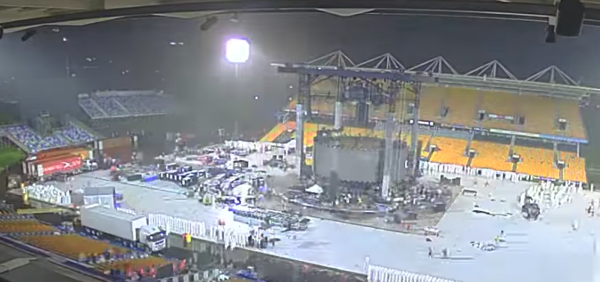
At the end of the concert, production pack out started – with a large number of truck and container movements
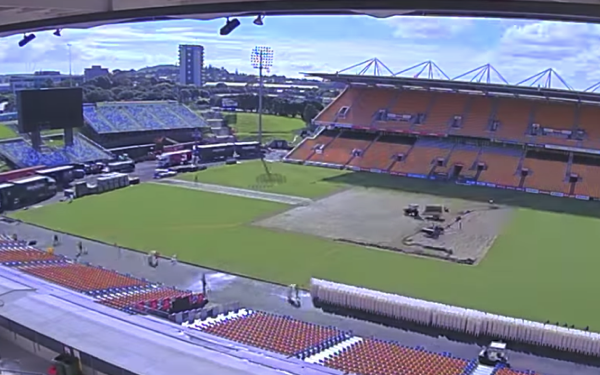
Then 3 days later turf repair/replacement could start
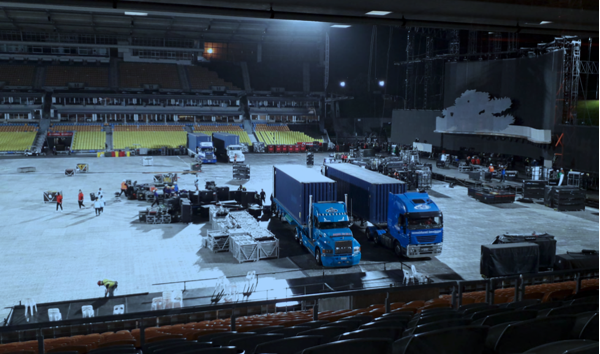
And for U2 this year we can see trucks on field for the production pack in (4 in this photo).
EPTB propose to be able to do this ie rear unload/load 40ft containers from under the south stand, and to move
through 2 tunnels onto the field…?
What’s Eden Park Trust Board’s (EPTB) real financial position?
Eden Park Trust Board’s marketing campaign has led many to believe that EPT needs concerts to be financially sustainable, and the
underlying message is that locals will just have to put up with it.
We reject that notion entirely.
EPTB always makes a healthy cash profit, despite it being an extremely costly venue.
EPTB has 32 full time and 6 part-time staff. This includes twelve with “Managers” in their job title!
The “loss” that is always talked of, is wholly caused by depreciation on the largely free/gifted stands! EPTB did not pay for the new
South Stand through depreciation and no-one expects it put aside cash to replace it nor the East Stand in 70 years’ time.
What Ratepayers expect is a venue that meets its planned maintenance costs. They don’t expect spending on expensive re-branding, promotions, around the world trips and unrealistic resource consent applications.
The Eden Park Trust Board has also walked away from cost savings that they could have been achieving since 2014, by working a
shared services model with Council’s own stadiums. These savings were reported to be up to $5m pa.
While concerts appear attractive, they come with business risks – which work when, such as with Mt Smart, there are no other summer sport events being pushed out. But moving cricket, early Blues season games to accommodate potential concerts, means lost revenue, and also not supporting the grounds sporting focus, which is something emphasised in the Unitary Plan.
Despite what many have been led to believe, EPTB were not “bailed out” by Council last year.
They had debts, which were underwritten by Council. Those debts were largely existing pre RWC debt, EPTB’s agreed contribution to the redevelopment, along with extras the EPTB wanted, such as the East Stand.
Council decided to shift this from a guarantee, which was an onerous structure for both EPTB and Council, and to provide the loan
directly, based on Council’s lower borrowing costs.
However, that did not “bail out” EPTB. The loan is still paying interest and covering Council’s costs.
The loan will also be repaid overtime and is protected by a mortgage over the ground.
EPTB also approached Council to help with maintenance costs over the next 3 years – some $9.8m. This was intended by Council to also be a loan, but without a repayment date. However, on a very narrow vote, this for political reasons became a gift.
It was unclear at the time why EPTB couldn’t fund their own normal turf replacement and maintenance, out of their substantial cash
profits, or by selling investment properties.
However, since then, we have of course seen the substantial investment in the campaign for concerts, and also a planned 43m x 8m super video screen.
Financial background
EPTB makes a healthy profit before depreciation.
| Year | Profit before Depreciation & Revaluations |
|---|---|
| 2019 | 2.5m |
| 2018 | 2.1m |
| 2017 | 4.1m (Lions tour) |
| 2016 | 1.9m |
| 2015 | 0.4m |
2020 was predicted by EPTB to be even better with a return to 2 All Black tests and 5 cricket internationals. Also, Eden Park will receive
approx. $3.3m of Council funding/grants for the next 3 years. Indicating a likely profit before depreciation of over $6m per year.
Covid-19 may have a temporary impact this year but does not change the underlying fundamentals.
These profits, along with sales of Cricket Ave properties, has enabled EPTB to repay $6m of loans in the last few years – despite not
cutting costs with shared services with Regional Facilities Auckland (RFA), or pursuing naming rights.
Depreciation, while required from an accounting point of view, does not impact their future sustainability. EPTB also depreciates its
buildings over a much shorter time frame (40 yrs) than other stadia (70 yrs) – making the depreciation higher and the loss after
depreciation look worse than it should be.
EPTB is therefore sustainable with a good underlying profit – without the need for concerts. EPTB has potential to add substantial funds
direct to this profit as will be seen below.
The Trustees view of the grounds current sustainability can be seen in the trustee fees paid out since they were put in place in 2010 –
over $1.2m:
| Year | Trustee Fee |
|---|---|
| 2009 | 0 |
| 2010 | 120,000 |
| 2011 | 120,000 |
| 2012 | 118,000 |
| 2013 | 104,000 |
| 2014 | 102,000 |
| 2015 | 110,00 |
| 2016 | 130,000 |
| 2017 | 144,000 |
| 2018 | 144,000 |
| 2019 | 145,000 |
| TOTAL | 1,237,000 |
The Trust Deed/legislation only allows that trustee fees “may” be paid. So we see that as a sign of the Trustees own faith in the
sustainability of the venue.
In 2014 RFA proposed Eden Park cost savings of up to $5m pa through sharing services/staff with them. Eden Park declined to
participate in savings or further investigations.
See: https://www.nzherald.co.nz/nz/news/article.cfm?c_id=1&objectid=11333220
It has been, and remains a high overhead/costly venue. 32 Fulltime, and 6 part-time staff as noted above.
See Charities registry annual return:
https://register.charities.govt.nz/CharitiesRegister/ViewCharity?accountId=451f441c-1531-dd11-8f7f-0015c5f3da29&searchId=68eeacea-bfd7-4f0b-a9eb-64ab8d253d1c
Under “Annual return” – summary on right.
And from EPTB’s annual accounts:
Total staff costs
2019 2.7m
2018 2.4m
2017 2.6m
2016 2.4m
Key Management compensation
2019 1.4m
2018 1.1m
EPTB does not need to take concert revenue off Council run venues, in order to continue to operate, and it does not need to impose the
impacts of concerts on the surrounding and wider area.
Don’t trust the EPTB survey nonsense
Eden Park often refer to 87% of locals supporting concerts – this is based on a highly questionable survey from 2018.
The constant reference to this is just a ploy to make you give up and not submit in opposition to concerts ie what’s the point.
But there is a very real reason not to fall for this – and its backed up by proper analysis of the actual 2018 submissions
where local ones were 5 to 1 against the concert (and that was for a supposed charity event).
In that analysis “local” was defined as north of Balmoral Rd, and included Morningside and east of Dominion Rd to Mt Eden Rd.
Whereas the survey quoted, achieved its figures by first defining an extremely wide area as the “local” area.
The area spread as far as down through Balmoral, Sandringham and over to Mt Albert, as detailed below in a response to a Herald enquiry.
However almost none of the area would have had any day to day impacts from Eden Park events, whether they be night games, day games, non sporting events or the 700-1000 functions per year (including school balls).
This makes those responses meaningless when considering views of people actually impacted and will have adverse effects from concerts.
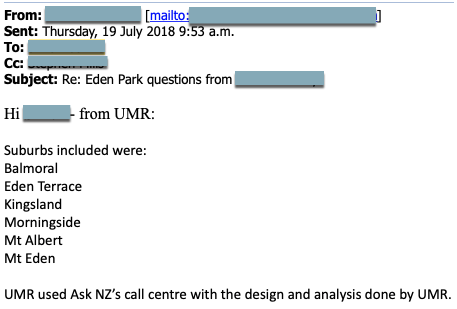
After using a very wide local area, it then used leading questions, and seemed to have a very leading script – as detailed below by someone who documented the introduction and background given prior to the questions – including references to state housing before asking about concerts!
They documented their experience in an email at the time:
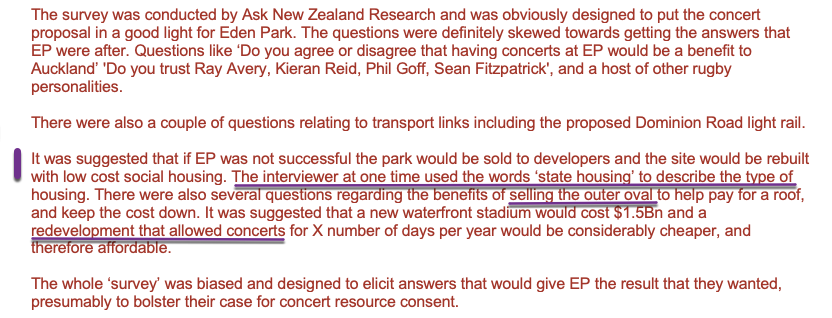
As can be seen above they even appear to have tied concerts to already having a roofed stadium!
Obviously no reliance can be placed on the results given the leading nature of the script and questions.
It is worth noting here that the Herald did not receive a copy of the actual survey, questions, script or methodology.
Just a Powerpoint of a handful of questions, prepared by a PR consultant.
Even the summary appears to show questions summarised differently ie from an additional 15 non sporting including concerts, to being stated as 15 concerts.
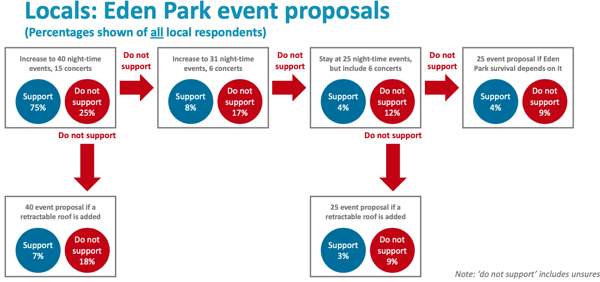
Above only mentions concerts – and obviously leads – remembering this includes people way down in Mt Albert.
But now the same numbers are for other events as well as concerts:

The above just confirms what we heard at the time from various people phoned – it can’t be relied upon at all – other than showing the games at play.
The only factual data available is the 5 to 1 opposed via actual submissions in 2018 – completely reverses the numbers above.
The Unitary Plan, which rejected concerts, and put in place the current tougher rules is also a factual record of submitters who would have been impacted.
The EPNA submission had 145 supporting submissions. Eden Park’s submission wanting concerts had 3 in support, and 211 opposing.
